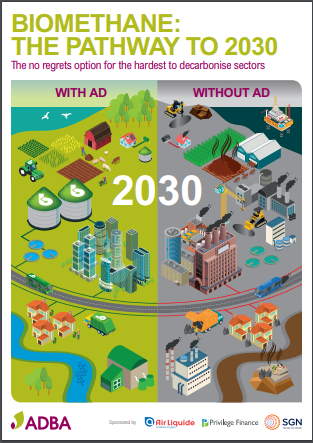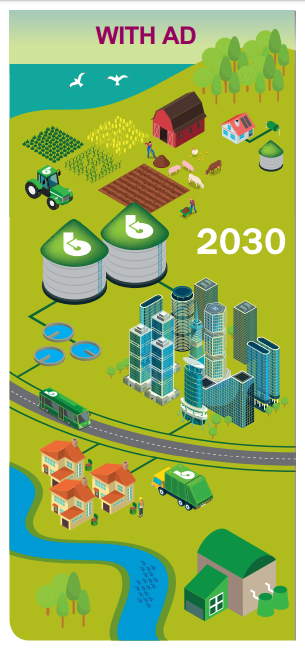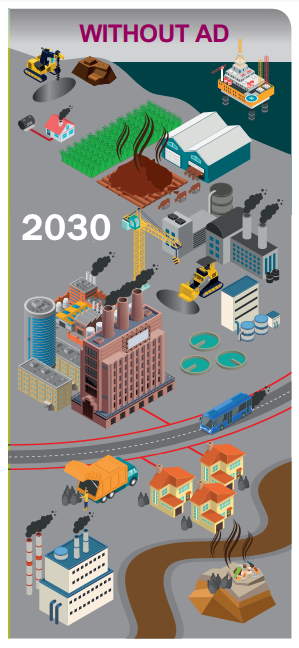Wondering where UK Government Action is most needed to cut carbon emissions? A new report says that assisting UK biomethane production could cut 1/3 off the carbon emission from the hardest to decarbonise sectors. Hopefully the UK, and other governments, are currently thinking hard on how to cut it! The new report says that assisting biomethane production could cut just under 1/3 of the UK's 2030 carbon target if used in the toughest-to-reduce-carbon-emissions sectors.
Some people have been dismissing the use of anaerobic digestion recently, as having any role at all in reducing the global carbon emissions blamed for causing rising temperatures. They point to the rapid introduction of wind energy, and solar, and allude to biogas as being high-cost.
They just don't get it… At some level, possibly even subconsciously, they connect biogas with “waste” and smells that they find distasteful. Politicians think of badly implemented government subsidies which have either been over generous and hence over subscribed, or frankly not been thought through properly in the first place.
That's unfair!
These attitudes need reconsidering. And, it is now urgent that they are, in this time of unheard of intensities of forest fires, drought and flooding.
 The anaerobic digestion and biogas industry does not seek hand-outs. It seeks recognition for what it can do. Plus, a level playing field to further develop tried-and-tested technologies to save carbon emissions in the most difficult to decarbonise sectors (such as heavy goods transport, and heating homes and business via the gas grid) where:
The anaerobic digestion and biogas industry does not seek hand-outs. It seeks recognition for what it can do. Plus, a level playing field to further develop tried-and-tested technologies to save carbon emissions in the most difficult to decarbonise sectors (such as heavy goods transport, and heating homes and business via the gas grid) where:
- few opportunities exist to reduce carbon emissions using currently available technologies
- quite apart from the carbon reducing opportunity, the wholesale introduction of biomethane can also bring enormous additional benefits (e. g. in jobs, air quality improvement, and reducing other emissions such as polluting forms of nitrogen).
Biogas as biomethane is NOT promoted any longer as a competitor with wind and solar. No longer does the biogas industry seek to be promoted for electricity generation in competition with lower cost technologies (although many contest that they are cheaper overall).
It's how to cut carbon emissions with “The no regrets option for the hardest to decarbonise sectors”.
Read on and find out where biogas (biomethane) has a unique role in the Press Release which follows:
ADBA Press Release (3 March 2020):
Biomethane could deliver 30% of the UK’s 2030 carbon budget in hardest to decarbonise sectors, provide green heat to 6.4 million homes and create 30,000 jobs by 2030, says report
- With a supportive policy environment, anaerobic digestion (AD) technology could produce 8 billion m3 biomethane/year, enough to heat 6.4 million homes, by 2030.
- This would deliver a 6% reduction in total UK greenhouse gases emissions, specifically within the hard-to-decarbonise sectors of heat, transport, waste management and agriculture, and 30% of the reduction needed by 2030 to meet our legally binding carbon budget.
- The industry would directly create 30,000 green jobs and become a leading exporter of innovation, technology and professional expertise.
- The report sets out the pathway to full deployment by 2030 and identifies policy asks to stimulate growth.
Alan Whitehead MP today hosted the launch of Biomethane: the pathway to 2030, a major report by the Anaerobic Digestion and Bioresources Association (ADBA), which highlights the potential for biomethane to cut emissions in the hardest to decarbonise sectors of the UK economy such as heat, transport, waste management and agriculture, and achieve the country’s Net Zero target.
Fully deployed, the biomethane industry could deliver a 6% reduction in the UK's greenhouse gas emissions by 2030 – a third of the 5th Carbon Budget target – and provide heating for 6.4 million homes. It would also create tens of thousands of jobs, boost energy and food production security, attract investment into the green economy and enhance Britain's competitiveness on the international sustainable technology market.

Unlocking this potential however requires a supportive policy environment and the report identifies the key policy asks that will enable the industry to flourish:
- immediate support for biomethane production beyond 2021
- extension of the Renewable Transport Fuel Obligation beyond 2032
- funding for innovation
- establishment of resource hierarchies for all organic wastes with AD as the optimal recycling technology
- development of a renewable biofertiliser obligation
- support for local circular economy projects around food waste recycling through AD into heat and power generation
Charlotte Morton, ADBA Chief Executive, said:
“Our sector has seen periods of very strong growth in the last decade as a direct result of supportive policy, but this has stalled in recent years due to the withdrawal of support. The next ten years, dubbed the climate decade, are our last chance to reverse the climate crisis. To reach its full potential by 2030 and make a real impact, the industry must grow faster than it has ever done. We therefore need robust and immediate support from government to capitalize on the sector's wide-ranging environmental and social benefits, and to unlock a commercially viable, world-class AD industry with goods, services and expertise that can be exported around the world. In the face of the climate emergency, AD is not an option, it's a necessity, and a technology that needs to be fully deployed NOW to create the healthy environment and healthy green economy that the UK needs.”
The report has been sponsored by Air Liquide, Privilege Finance and SNG.
Industry Comments on How to Cut Carbon Emissions the ADBA Way
Chris Winward, Chief Commercial Officer at Privilege Finance, commented:
“Now is the time for us to ensure policy makers understand the potential for energy from waste technologies to contribute towards achieving net zero and the creation of a more circular economy. Sending waste to landfill that could be used for energy production needs to be seen as socially unacceptable. Existing anaerobic digestion technologies offer a solution to both the problem of producing materials that ultimately end up in landfill, and the need to decarbonise our energy system.”

John Morea, CEO of SNG, said:
“The injection of further biomethane into the gas network is key to decarbonise heating through the 2020s and involves no disruptive changes for customers. We hope this report will raise the profile of the potential for biomethane to deliver a third of the carbon savings necessary to meet the UK’s legally binding fifth carbon budget and allow for the necessary policies to be introduced from when the Renewable Heat Incentive ends in March 2021.”
David Smith, Chief Executive of Energy Networks Association, said:
“We welcome this report that clearly shows the benefits of biomethane and anaerobic digestion which must play a critical role in helping us get to net zero. They are good for the environment, good for the economy and good for the public who will benefit from a low carbon, low cost energy system. In the run-up to COP 26 this year, what we now need is a commitment to roll-out the world’s first zero-carbon gas grid.”
ADBA Press Release Ends
How to Choose the Best Electric Vehicle for a Climate-Conscious Home
To choose the best electric vehicle (EV), first assess what you need the car for, including daily driving distance, what charging options you need, and your budget. Next: Consider range, charging speed, and real-world performance. Finally, factor in body styling, features, and reliability to compare models. Key Takeaways Electric vehicles reduce your carbon footprint by […]
Environmental Responsibility is Rising—Here’s Why There’s Climate Hope in 2025
From Despair to Action: Climate Hope & Environmental Responsibility in 2025 In recent years, it’s been easy to feel overwhelmed by the barrage of dire climate news. With reports of impending tipping points, record-breaking heatwaves, and rapidly melting ice caps, the weight of it all can feel insurmountable. The year 2024 was yet another year […]
Affordable Electric Cars Promised at COP26 – What it Means for You
Affordable electric cars have been promised at COP26. The UN Climate Change Conference 2021 in Glasgow has committed to making zero-emission vehicles “affordable for everyone.” As governments attempt to limit transportation's role in global warming, UN climate negotiations have agreed on a programme to make electric automobiles and other zero-emission vehicles available and affordable in […]
Good Reasons to be Optimistic About Averting Climate Change
Isn't it time to start being optimistic about averting climate change? There are many good reasons to consider that the tide is turning and a huge swell of social forces is now ready to push through the huge changes needed? The following is an article republished from Business Green, which we think deserve further thought: […]






